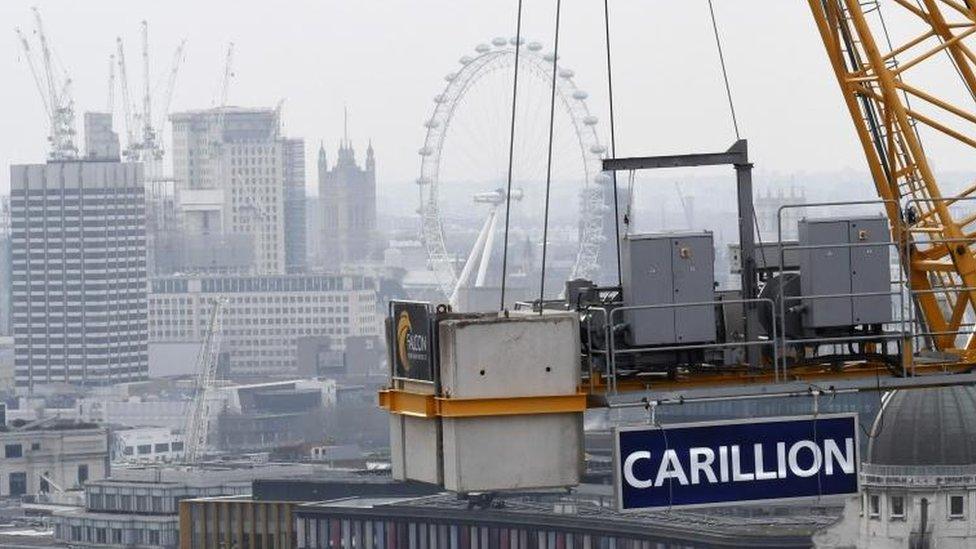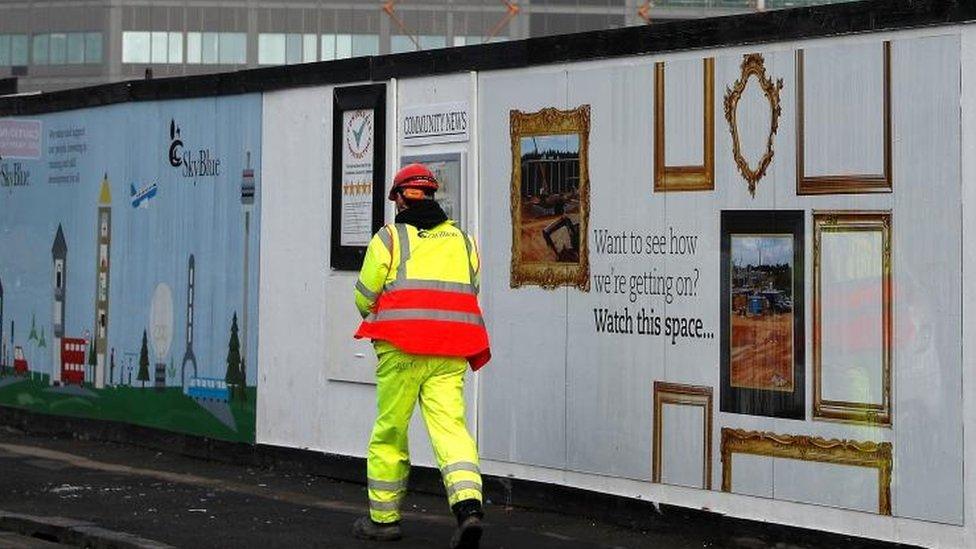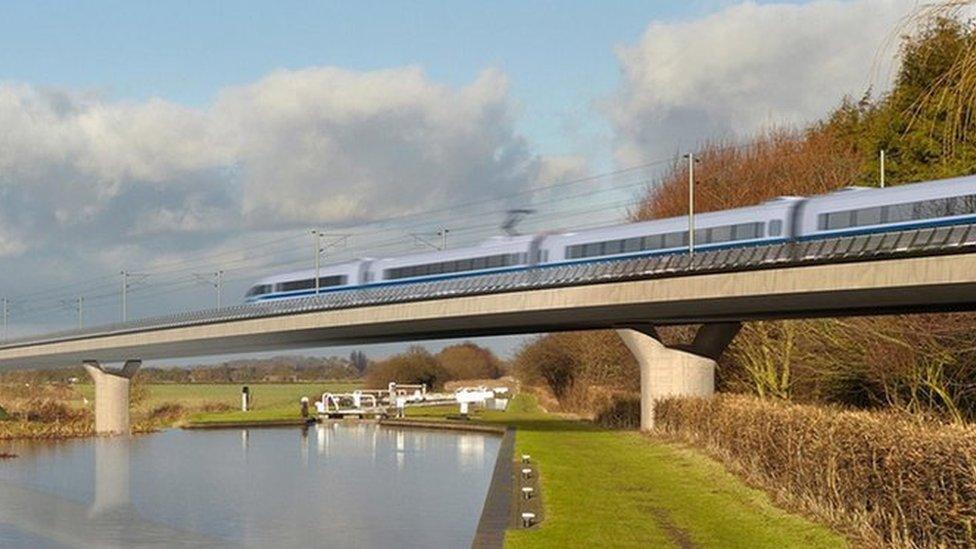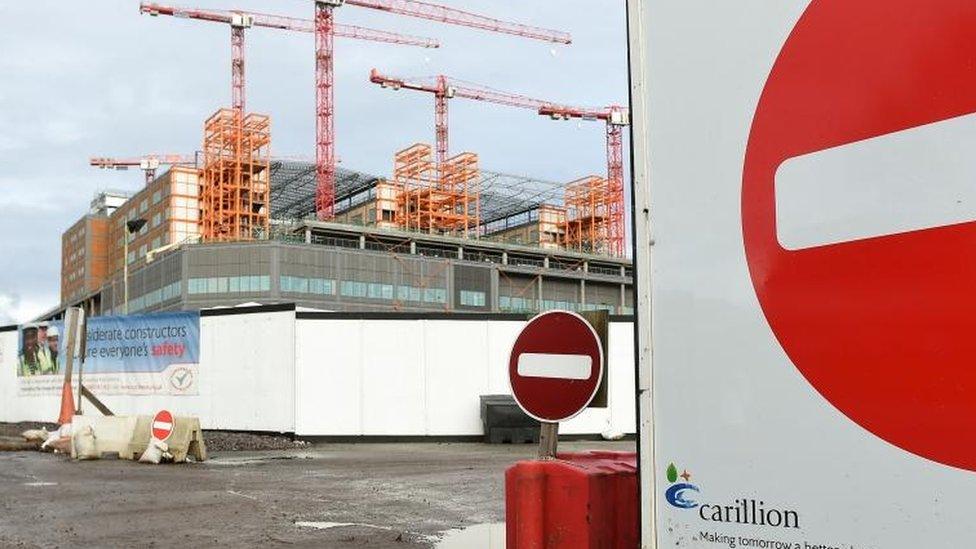Carillion collapse: What next?
- Published

The collapse of Carillion, the UK's second biggest construction firm, should not make much immediate difference to the services it provides.
Following the news of its liquidation, the government has said it will provide funding to maintain Carillion's work in the public sector.
But in the longer term, there are plenty of question marks over its uncompleted projects, as well as jobs and pensions.
The company collapsed under the weight of £1.5bn of debt, including a £587m pension shortfall.
Its problems arose from risky contracts which proved unprofitable and payment delays in the Middle East.
Will there be job losses?
Carillion employs 43,000 staff globally, 20,000 of them in the UK, where it does most of its business.
They include construction workers, as well as hospital cleaners, prison maintenance workers, port staff and workers in the energy and utilities sector.
Where Carillion is part of a consortium, the staff could be taken on by the other companies.
Or if contracts were taken back into the public sector, the staff could then be employed directly by the government, health authorities, or local government.

Of course, that leaves aside what happens to Carillion's private sector contracts, which is unclear at present.
The company also subcontracts some of its work to smaller firms, while the Unite union said it understood there were also "several thousand" jobs at risk in the construction supply chain.
BBC business editor Simon Jack said "real pain" could be felt by these subcontractors, many of whom were small and medium-sized businesses for whom payment delays or failures could threaten their future.
What about the pensioners?
There is a £587m shortfall in the Carillion pension scheme and 28,000 members of its 13 separate schemes.
The government, the Pensions Regulator and representatives from the firm held talks to discuss the firm's options on Friday.
A spokesperson for the Pension Protection Fund (PPF) acknowledged that news of Carillion's liquidation raised "serious concerns for all people involved".
"We want to reassure members of Carillion's defined benefit pension schemes that their benefits are protected by the PPF."
Nicola Parish, executive director at the Pensions Regulator, said: "We continue to work closely with all relevant parties in what are very challenging circumstances... to help achieve the best possible outcome for members of the pension schemes and those impacted by the situation.
Speaking before news of Carillion's collapse, pensions consultant John Ralfe said the scheme's members "shouldn't be losing any sleep".
He said the "good news" was that whatever happened, the members would get compensation from the PPF, which generally meant their pension would be about 85% of what they might have expected to receive.
What happens to its contracts?
The big question is who will pick up the firm's loss-making public contracts - another outsourced services provider or the government itself?
The BBC's Simon Jack says the government may have to resort to temporary nationalisation of parts of the business.
"I'm told that there are plans in hand to do just that with the contract to run the prisons," he wrote before the liquidation was announced.

However, in instances where Carillion is part of a consortium with other companies, as it is with the design and build of its HS2 contracts, its role could be assumed by the other contractors.
In situations where Carillion is the sole contractor, the work may be taken in-house by Network Rail, for example.
What are the implications for the taxpayer?
The taxpayer has been called upon before to bail out firms, notably during the financial crisis with RBS and Lloyds.
But despite feelings in some quarters that Carillion was "too big to fail", the government was not prepared to step in and prevent its collapse.
Cabinet Office minister David Lidington said that "taxpayers cannot be expected to bail out a private sector company".
Liberal Democrat leader Sir Vince Cable has called for the government to take responsibility for Carillion's big contracts or re-tender them, in order to keep the supply chain going.
"We also urgently need a Parliamentary inquiry into some of the very questionable decisions made in the past few months, not least the award of public contracts to a company that was clearly in danger of collapse," he said.
What does this mean for Private Finance Initiatives?
A private finance initiative, or PFI, is a way of financing big public sector projects by getting private firms to implement and manage them.
Under this system, the upfront costs are handled by the private company, which is then paid back by the government over a set period of time.
Critics argue the government can end up overpaying, and that governments use them as an accounting gimmick to get public-sector borrowing figures down.
PFIs have been around in the UK since 1992 and have been used by both Conservative and Labour governments. But there is widespread sentiment that Carillion's collapse shows up their limitations.
Bernard Jenkin, the Conservative chairman of the House of Commons Public Administration Committee, said Carillion's collapse "really shakes public confidence in the ability of the private sector to deliver public services and infrastructure".
He said there needed to be a change of "mindset" at companies that do a lot of work for the taxpayer.
"You've got to treat yourself much more as a branch of the public service, not as a private company just there to enrich the shareholders and the directors," he said.

Lord Adonis, who resigned last month as chairman of the government's Infrastructure Commission, said Mr Jenkin was "absolutely right".
"If the only way we can get private companies to deliver public services is constantly to bail them out and put them on life support, then that doesn't deliver for the taxpayer," he added.
Lord Adonis said the state had to be prepared to step in as a "last resort" to provide public services itself.
"If these contracts simply cannot be run competitively and cost-effectively by the private sector, then there will be no choice but to bring them in [to the public sector]," he warned.
However, he added: "There are other private companies that have done a perfectly good job on behalf of the taxpayer."